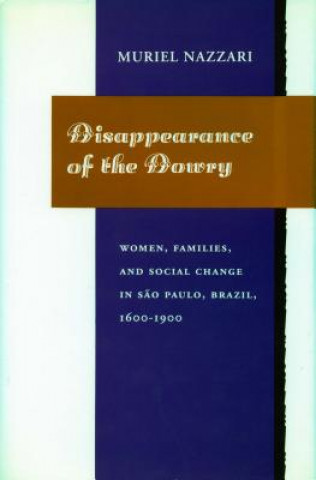
Kod: 04716069
Disappearance of the Dowry
Autor Muriel Nazzari
Examining the practice of dowry in the city of Sao Paulo, Brazil, and its surroundings for nearly three centuries, this book locates patterns of change that explain the dowry's virtual disappearance by the beginning of the twentie ... więcej
- Język:
 Angielski
Angielski - Oprawa: Twarda
- Liczba stron: 268
Wydawca: Stanford University Press, 1991
- Więcej informacji o książce

405.33 zł

Dostępna u dostawcy w małych ilościach
Wysyłamy za 10 - 14 dni
Potrzebujesz więcej egzemplarzy?Jeżeli jesteś zainteresowany zakupem większej ilości egzemplarzy, skontaktuj się z nami, aby sprawdzić ich dostępność.
Dodaj do schowka
Zobacz książki o podobnej tematyce
-

Discussions and More
328.20 zł -4 % -

Murder, Mr Mosley
172.45 zł -

Ecotoxicology
1932.95 zł -

Circle to God
148.36 zł -

Deep Learning in Healthcare
929.78 zł -
![Collection of Poems in Six Volumes. by Several Hands. [Edited by Robert Dodsley.] Collection of Poems in Six Volumes. by Several Hands. [Edited by Robert Dodsley.]](https://media.libris.to/jacket/08000021t.jpg)
Collection of Poems in Six Volumes. by Several Hands. [Edited by Robert Dodsley.]
136.12 zł -5 % -

Advances in Cognition, Education and Deafness
282.46 zł -

Cities of God
271.63 zł -

Crop Circles, Jung, and the Reemergence of the Archetypal Feminine
88.85 zł -11 % -

All Mankind is One
93 zł -7 % -

Cloister and the Hearth ... Second Edition.
128.33 zł -4 % -

Journey Shared
55.55 zł -4 % -

14 Ways to Accomplish Your Mission
63.45 zł -4 % -

Advertising
2535.33 zł -9 %
Podaruj tę książkę jeszcze dziś
- Zamów książkę i wybierz "Wyślij jako prezent".
- Natychmiast wyślemy Ci bon podarunkowy, który możesz przekazać adresatowi prezentu.
- Książka zostanie wysłana do adresata, a Ty o nic nie musisz się martwić.
Więcej informacji o Disappearance of the Dowry
Za ten zakup dostaniesz 235 punkty
 Opis
Opis
Examining the practice of dowry in the city of Sao Paulo, Brazil, and its surroundings for nearly three centuries, this book locates patterns of change that explain the dowry's virtual disappearance by the beginning of the twentieth century. In the seventeenth century, 91 percent of the sample of propertied families gave their daughters dowries; in the nineteenth century, only 27 percent of the families did so. Furthermore, of those families who still gave dowries in the nineteenth century, many gave a dowry to only one or two of several daughters. In the seventeenth century, daughters were favorer over sons, for they received dowries that were much larger than what their brothers would inherit later on. By the nineteenth century, parents were spending much money on their son's education while giving their daughters smaller dowries or no dowries at all. A seventeenth-century dowry included land, houses, cattle, and Indian and African slaves, so that the bride contributed most of the support of the newlyweds. By the end of the nineteenth century, the bride contributed little to the support of the married couple. As the practice of dowry declined and disappeared, it was accompanied by an ideological change. From viewing dowry as something that ensured their daughters' well-being, people came to see dowry as a way men sold themselves for easy money instead of supporting their families with hard work. Why did a practice that had been considered a duty stop being a duty? Why did property-owning families modify their behaviour regarding sons and daughters? And what were the consequences for the women of these families? Although the dowry declined and disappeared elsewhere - in most of Europe, in England, and in Mexico - this is the first book to study and document its disappearance. The author argues that the practice of dowry altered because of changes in society, the family, and marriage. Brazil changed from a hierarchical society in which status, family, and patron-client relations were primarily to a more individualistic society in which contract and the market increasingly reigned. The family changed from being the locus of both production and consumption to being principally the locus of consumption, while 'family' and 'business' became formally separated. m arriage was transformed from predominantly a property matter to an avowed 'love' relationship. At the same time, the strong authority of the patriarch over adult sons and daughters was greatly diminished.
 Szczegóły książki
Szczegóły książki
Kategoria Książki po angielsku Society & social sciences Society & culture: general Social groups
405.33 zł
- Pełny tytuł: Disappearance of the Dowry
- Podtytuł: Women, Families, and Social Change in Sao Paulo, Brazil, 1600-1900
- Autor: Muriel Nazzari
- Język:
 Angielski
Angielski - Oprawa: Twarda
- Liczba stron: 268
- EAN: 9780804719285
- ISBN: 0804719284
- ID: 04716069
- Wydawca: Stanford University Press
- Waga: 548 g
- Wymiary: 229 × 152 × 19 mm
- Data wydania: 01. October 1991
Ulubione w innej kategorii
-

Women Who Run with the Wolves
48.26 zł -

Freedom Writers Diary
63.24 zł -15 % -

Think Like a Monk
50.70 zł -26 % -

Orientalism
52.62 zł -15 % -

How Europe Underdeveloped Africa
83.99 zł -9 % -

Desert Flower
50.90 zł -11 % -

Why Does He Do That?
72.25 zł -13 % -

Letters to a Young Muslim
52.21 zł -23 % -

Eros and Mysteries of Love
84.19 zł -7 % -

Life After Darkness
104.03 zł -11 % -

Puer Tea
182.77 zł -

Womanhood
93.81 zł -23 % -

JFK - 9/11
139.56 zł -

Complete Book of Pilates for Men
92.80 zł -10 % -

Gypsy Identities 1500-2000
287.32 zł -

Servitors of Empire
85.91 zł -4 % -

Sword of No-sword
111.42 zł -11 % -

Colloquial Yiddish
290.25 zł -

Gerotranscendence
607.94 zł -

Northwest Coast Indian Art
124.37 zł -6 % -

Qur'an
139.86 zł -23 % -

When God Was A Woman
77.62 zł -11 % -

The Mastery of Love
60.71 zł -7 % -

Vintage Menswear
74.68 zł -5 % -

Who Cooked the Last Supper?
86.22 zł -4 % -

Women Who Run With The Wolves
70.53 zł -14 % -

The Way of Men
68.61 zł -7 % -

The Autobiography of Malcolm X
42.80 zł -12 % -

Second Sex
50.70 zł -26 % -

Goddesses in Everywoman
52.21 zł -23 % -

Talking with Female Serial Killers - A chilling study of the most evil women in the world
47.56 zł -23 % -

Intellectuals and Society
107.78 zł -10 % -

Women in the Qur'an
85 zł -7 % -

Erotic Bondage Book
73.77 zł -5 % -

Zami
47.56 zł -23 % -

Nine Years among the Indians, 1870-1879
103.83 zł -6 % -

Dark Emu
70.73 zł -23 % -

Childhood and Society
81.06 zł -6 % -

Happy City
52.21 zł -23 % -

The Male Nude
82.78 zł -4 % -

The Bell Curve
80.04 zł -23 % -

We Should All Be Feminists
33.79 zł -23 % -

Empire of the Summer Moon
61.52 zł -23 % -

Radium Girls
47.56 zł -23 % -

Dance of Anger
47.56 zł -23 % -

Beauty Myth
61.52 zł -23 % -

Muqaddimah
103.83 zł -6 % -

TROUBLEMAKER
77.21 zł -7 % -

Ladies' Book of Etiquette and Manual of Politeness
65.37 zł -6 %
zadowolonych klientów
Od roku 2008 obsłużyliśmy wielu miłośników książek, ale dla nas każdy był tym wyjątkowym.
Copyright! ©2008-24 libristo.pl Wszelkie prawa zastrzeżonePrywatnieCookies


 21 milionów książek
21 milionów książek Dostawa 10.99 zł
Dostawa 10.99 zł (32) 444 93 66 (8-15.30h)
(32) 444 93 66 (8-15.30h)